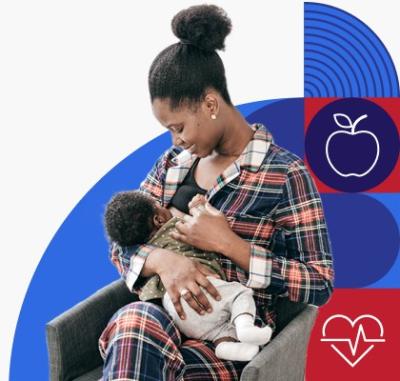Doctor Visits
Make the Most of Your Baby’s Visit to the Doctor (Ages 0 to 11 Months)

The Basics
Overview
Babies need to see the doctor or nurse for a “well-baby visit” 6 times before their first birthday.
A well-baby visit (also called a checkup) is when you take your baby to the doctor to make sure they’re healthy and developing normally. This is different from visits for sickness or injury.
At a well-baby visit, the doctor or nurse can help catch any problems early, when they may be easier to treat. You’ll also have a chance to ask any questions you have about caring for your baby.
Learn what to expect so you can make the most of each well-baby visit.
Well-Baby Visits
How often do I need to take my baby for well-baby visits?
Babies need to see the doctor or nurse at least 6 times before their first birthday. Your baby is growing and changing quickly, so regular visits are important.
For most babies, the first well-baby visit is 2 to 3 days after coming home from the hospital. After that first visit, babies need to see the doctor or nurse when they’re:
- 1 month old
- 2 months old
- 4 months old
- 6 months old
- 9 months old
If you’re worried about your baby’s health, don’t wait until the next scheduled visit — call the doctor or nurse right away.
Child Development
How do I know if my baby is growing and developing on schedule?
Your baby’s doctor or nurse can help you understand how your baby is developing and learning to do new things — like smile or turn their head to hear your voice. These are sometimes called “developmental milestones.”
At each visit, the doctor or nurse will ask you how you’re doing as a parent and what new things your baby is learning to do. They may also ask how you’re feeling and if you need any support.
1 Month
By age 1 month, most babies:
- Hold their hands in tight fists
- Move their arms in jerky motions
- Focus their eyes on something 8 to 12 inches away
- Like sweet smells
2 Months
By age 2 months, most babies:
- Lift their head when lying on their stomach
- Look at your face
- Smile when you talk to them
- React to loud sounds
4 Months
By age 4 months, most babies:
- Bring their hands to their mouth
- Make cooing sounds
- Hold toys that you put in their hand
- Turn their head to the sound of your voice
- Make sounds when you talk to them
6 Months
By age 6 months, most babies:
- Lean on their hands for support when sitting
- Roll over from their stomach to their back
- Show interest in and reach for objects
- Recognize familiar people
- Like to look at themselves in a mirror
9 Months
By age 9 months, most babies:
- Make different sounds like “mamamama” and “bababababa”
- Smile or laugh when you play peek-a-boo
- Look at you when you say their name
- Sit without support
See a complete list of milestones for kids age 9 months.
What if I'm worried about my baby's development?
Every baby develops a little differently. But if you’re worried about your child’s growth and development, talk to your baby’s doctor or nurse.
Take Action
Get Ready
Take these steps to help you and your baby get the most out of well-baby visits.
Gather important information.
Take any medical records you have to the appointment, including a record of vaccines (shots) your baby has received and results from newborn screenings. Read about newborn screenings.
Make a list of any important changes in your baby’s life since the last doctor’s visit, like:
- Being sick
- Falling or getting injured
- Starting daycare or getting a new caregiver
Use this tool to keep track of your baby’s family health history. This information will help your doctor or nurse know if your baby is at risk for certain health problems.
Ask other caregivers about your child.
Before you visit the doctor, talk with others who care for your child, like a grandparent, daycare provider, or babysitter. They may be able to help you think of questions to ask the doctor or nurse.
What about cost?
Under the Affordable Care Act, insurance plans must cover well-baby visits. Depending on your insurance plan, you may be able to get well-baby visits at no cost to you. Check with your insurance company to find out more.
Your child may also qualify for free or low-cost health insurance through Medicaid or the Children’s Health Insurance Program (CHIP). Learn about coverage options for your family.
If you don’t have insurance, you may still be able to get free or low-cost well-baby visits. Find a health center near you and ask about well-baby visits.
To learn more, check out these resources:
Ask Questions
Make a list of questions to ask the doctor.
Before the well-baby visit, write down a few questions you have. Each well-baby visit is a great time to ask the doctor or nurse any questions about:
- How your baby is growing and developing
- How your baby is sleeping
- Feeding your baby breastmilk or formula
- When and how to start giving your baby solid foods
- What changes and behaviors to expect in the coming months
- How to make sure your home is safe for a growing baby
Here are some questions you may want to ask:
- Is my baby up to date on vaccines?
- Is my baby at a healthy weight? How can I make sure they’re getting enough to eat?
- How can I make sure my baby is sleeping safely — and getting enough sleep?
- How can I help my baby develop speech and language skills? What kind of books can I read to my baby?
- Is it okay for my baby to have screen time? How much?
- How do I clean my baby's teeth?
Take notes so you can remember the answers later.
Ask what to do if your baby gets sick.
- Make sure you know how to get in touch with a doctor or nurse when the office is closed
- Ask how to reach the doctor on call — or if there's a nurse information service you can call at night or on the weekend
What to Expect
Know what to expect.
During each well-baby visit, the doctor or nurse will ask you about your baby and do a physical exam. The doctor or nurse will then update your baby’s medical history with any new information.
The doctor or nurse will ask questions about your baby.
The doctor or nurse may ask about:
- Behavior: Does your baby copy your movements and sounds?
- Health: How many diapers does your baby wet each day? Does your baby spend time around people who are smoking or using e-cigarettes (vaping)?
- Safety: If you live in an older home, has it been inspected for lead? Do you have a safe car seat for your baby?
- Activities: Does your baby try to roll over? How often do you read to your baby?
- Eating habits: How often does your baby eat each day? How are you feeding your baby?
- Family: Do you have any worries about being a parent? Who can you count on to help you take care of your baby?
Your answers to questions like these will help the doctor or nurse make sure your baby is healthy, safe, and developing normally. Be honest, even if you’re worried you’re doing something wrong — the doctor or nurse is there to help you.
Physical Exam
The doctor or nurse will also check your baby’s body.
To check your baby’s body, the doctor or nurse will:
- Measure height, weight, and the size of your baby’s head
- Take your baby’s temperature
- Check your baby’s eyes and hearing
- Check your baby’s body parts (this is called a physical exam)
- Give your baby any vaccines they need
Learn more about your baby’s health care:
Content last updated October 21, 2025
Reviewer Information
This information on well-baby visits was adapted from materials from the Centers for Disease Control and Prevention and the National Institutes of Health.
Reviewed by:
Sara B. Kinsman, MD, PhD
Director, Division of Child, Adolescent and Family Health
Maternal and Child Health Bureau
Health Resources and Services Administration (HRSA)


